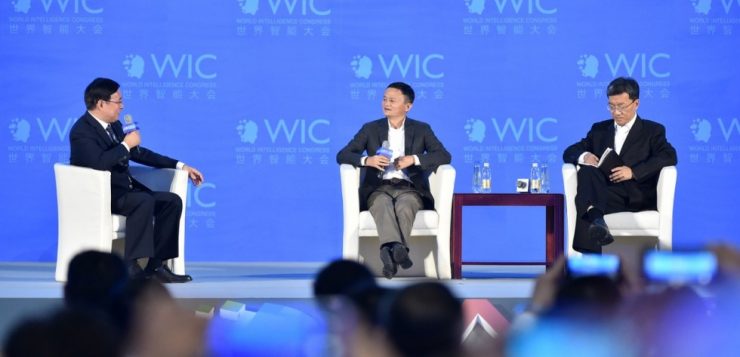There is a bubble in the world’s most popular cryptocurrency even as the underlying technology holds promise for securing privacy and safeguarding security, according to Alibaba Group Holding executive chairman Jack Ma Yun.
“There is no bubble for blockchain, but there’s a bitcoin bubble,” Ma said in a forum during the second World Intelligence Congress held in Tianjin on Wednesday.
A bubble is an economic cycle characterised by the rapid escalation of asset prices followed by a contraction, according to Investopedia. It is created by a surge in asset prices unwarranted by the fundamentals of the asset and driven by exuberant market behaviour.
Prices of bitcoin rebounded last month apparently due to an injection of “serious cash”, according to a Bloomberg report.
“Personally, I’m quite bullish about blockchain,” said Ma about the distributed ledger technology behind cryptocurrency bitcoin. “Alibaba has been conducting research on blockchain for several years.”
New York-listed Alibaba last year ranked first in blockchain patent applications worldwide, according to data compiled by IPRdaily, a Chinese-language intellectual property information provider.
Alibaba had 43 published blockchain patent applications last year, followed by Bank of America with 33.
Blockchain provides a distributed online database of encrypted transactions that multiple parties share and everyone can trust, which has enables a full audit trail for cryptocurrency trades. The technology has also been adopted in tackling counterfeits in the manufacturing supply chain and in enhancing banks’ trade finance services.
Ma said he regarded blockchain as a security and privacy solution, and never thought to turn into something like bitcoin to make money.
“Social networks may not need blockchain, but we are doing internet finance in which we process trillions of trading volume,” said Ma. “We have to turn to blockchain, otherwise it would be fatal.”
That attitude of Ma, one of Asia’s richest men, towards blockchain and cryptocurrency resonate with the Chinese government’s recent actions.
China helped raise the profile of blockchain when it became one of the first countries in the world to include the technology as part of a state-level policy. In 2016, Premier Li Keqiang said blockchain was written into the 13th Five-Year Plan, a road map for the country’s development in the five years to 2020.
The country has ratcheted up its adoption of blockchain, encouraging enterprises and research institutes to learn and use the technology, even as regulators continue the clampdown on initial coin offerings and other cryptocurrency-related activities in the domestic market.
As such, more than half of the world’s blockchain patent applications last year were from China, according to the US-based World Intellectual Patent Organisation.
The Chinese government’s positive stance towards blockchain points to a dualism in official policy, as Beijing has been steadfast in efforts to quash cryptocurrency trading as part of a campaign to root out financial risks, especially highly volatile activities that could leave investors with big losses.
Blockchain’s wide acceptance in China is now also reflected in where venture capital goes in the country. In the first quarter of this year, 41 per cent of start-ups that received funding in China were blockchain-related, according to a report by information service provider ITJUZI.
A growing number of unicorns – start-ups valued at more than US$1 billion – in China have embraced blockchain in a bid to help diversify their businesses.
Xiaomi, one of the world’s largest smartphone vendors, has developed a blockchain-based mobile game called Jiamitu. Cainiao, the Alibaba-backed logistics company, applies blockchain to track and verify information on its platform. Bike-sharing service provider Ofo established a blockchain research institute in Beijing, while rival Mobike developed a “blockchain-as-a-service” business.
Still, technology research firm Gartner said it does not expect large returns on blockchain initiatives until 2025. It means companies today will have to try different blockchain projects to determine if the technology provides value for them – that is, whether there will be new revenue possibilities, cost savings or improvements in their customers’ user experience, a recent Gartner report said.
“Blockchain is a hot term nowadays, but not every company can work on the technology,” said Ma. “Too many people are selling blockchain-related products, which concerns me.”
Read more at: South China Morning Post







